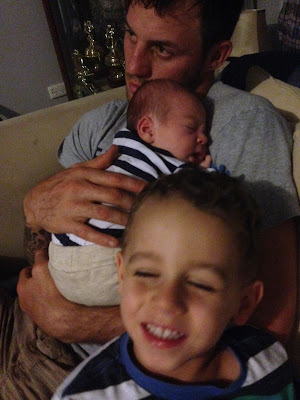In recent years there has been quite a bit of controversy regarding NFL player safety and head trauma. Boxing's checkered history has produced similar discussions, which Bob Dylan addressed in an iconic song titled "Who Killed Davey Moore?"
Davey Moore was a champion featherweight boxer who died after a fight with an upcoming Cuban boxer named Sugar Ramos in March, 1963. The incident triggered debates about the morality of boxing. Like Dylan, Phil Ochs had also written a song about the incident.
 |
| Davey Browne as doting father. |
EN: Did you ever go see boxing matches before meeting Davey?
Amy Lavelle: I did not see them live, no. I followed some of the bigger matches that were well known and promoted in mainstream media but more in the background.
EN: What was your first impression of the sport?
AL: I certainly was intrigued by the sport. There was something appealing about the discipline required to be a professional boxer and the physical effects of the training, the elite fitness that could be attained. I appreciate the skills and mindset required beyond the physical action of it. It is glorified and, like many sports, only a small percentage actually get to the elite level and "make it." It's tough and only few have what it takes because it is inherently dangerous.
EN: Ron Jackson wrote in Boxing Magazine, “After the death of a fighter there will always be calls to ban boxing.” But you responded differently. Why?
AL: Because there are conditions and rules stipulated under which officials are supposed to stop a fight. Even if none of them want to, it's their role and it is supposed to happen. There is a requirement for a ringside doctor. He is not there just in case, he has an active role in monitoring the fight. Otherwise when fighters are getting injured and the fight goes on, it's like a street brawl and that's not the sport of boxing as I see it. It is a sport with rules and can be great if it is conducted properly.
In the fights leading up to David's last one, 2 or 3 of them (which he won) were stopped by the referee and the losing opponent walked out of the ring and woke up ok the next day. It was clear David dominated and a TKO was called before David punched them so much that they were unnecessarily injured. This discernment was not exercised at David's fight.
Now, I understand that a freak punch can happen. A single punch to the head can cause unforeseen injury, even kill, and it's part of the risk of the sport. That I accept. But when a fighter is showing clear signs of concussion, does not know where he is, bounces off the ropes, is knocked to the ground, gets up unbalanced and needs help getting to and from his corner when the bell goes, that is when a fight needs to be stopped. To me that is no longer boxing.
AL: Davey was supposed to win the fight. It wasn't his night, he needed it to be stopped. He lost his own sense of what was going on because he suffered a head injury prior to being knocked out. Everyone was just going through the motions instead of attentively calculating what was actually happening. Maybe no one believed how hurt he was getting, or they just never thought it was going to be the worst case scenario. But I know he was not ok.
I sat back and thought there is no way he will go out for that last round, he is too hurt. The officials were simply incompetent and it was a "professional" fight organized and run in an unsophisticated and disorganized way. They expected Davey to come out like he had done for his previous fights and dominate. But he didn't, and there was no safety net for him. There should have been. But I think that is part of the boxing culture in Australia in that sub-elite category. Until you make the big time with the big money it's, evidently, not safe if you aren't on top of your game, every fight.
EN: Just out of curiosity, do wives of boxers ever get together and talk about boxing? If yes, what are some of the things they might talk about (with regard to their husband’s choice of careers)
AL: I didn't really discuss boxing much with other wives ("WAGS"?). I was close to my sister-in-law at the time (David's brothers' wife) and the most we talked about was the training and lifestyle of boxing I guess. Maybe some politics of it and frustrations. The usual stuff, not exclusive to boxing I'm sure.
EN: Thank you, Amy, for sharing your story. Wishing you the best as you continue to re-build a home for your growing sons.
Related Links
"Who Killed Davey Moore?" Bob Dylan, Live at Carnegie Hall, 1963
https://www.youtube.com/watch?v=LY31HqK135Q
Bob Dylan, Live at Newport
https://www.youtube.com/watch?v=us_yCFnP95I
60 Minutes Australia: Death of a Champ (warning: includes disturbing fight footage)
Photos courtesy Amy Lavelle






No comments:
Post a Comment